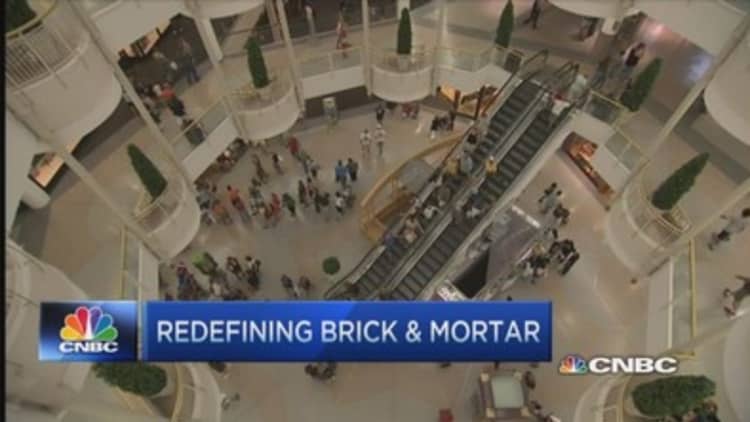
Even as online shopping sales continue to grow, more e-commerce players are proving that the physical space should not be ignored.
Google recently opened its first-ever shop in London to sell Android phones, Chromebook laptops and other gadgets. Meanwhile, Amazon is reportedly exploring a new kind of retail vision to sell products in a brick-and-mortar setting.
Read MoreGoogle opens its first store in...
But how does an online retailer justify the cost of setting up a brick-and-mortar shop? One solution is testing the waters with pop-up stores, where the retailer can experiment with a physical location without committing to a long-term lease.
Frank & Oak, an online menswear start-up, has taken this approach. The retailer gained early success exclusively through digital platforms by amassing 1.6 million members, at least $15 million in funding and a partnership with Etsy.
"A lot of people see Internet as next-generation and brick-and-mortar as being traditional. The way we see it is as a physical space that we can leverage to communicate our brand value," Ethan Song, Frank & Oak's founder recently said.
The company, which has several storefronts throughout Canada, is asking its customers to decide the location of its next six pop-up shops from 12 possibilities.
The stores are being designed more as experiences than just a place to buy clothes. Like their stores in Canada, which have barber shops and cafes, Frank & Oak's U.S. pop-ups will focus on creating a dynamic shopping experience.
"I think that when you think about our target market, a creative millennial, there's something there to create in the physical space," Song said.
Read MoreZappos sending message with pop-up shops: CEO
According to Stacey Widlitz, president of SW Retail Advisers, pop-up shops are preferable to a long-term lease obligation—sometimes 10 years—which can feel like an eternity for a start-up.
"Warby Parker [and] Bonobos have both had success crossing the line, and then converting brick-and-mortar consumers to online," Widlitz told CNBC.
Of course, there's also the benefit of actually being able to touch and try on a product like shoes, apparel or glasses.
"Pop-up shops are the most effective way to test the retail waters and bring your product to the consumer in a low cost, short-term [way]," she added. "The test might also help brands realize they are actually not ready for the physical world."


